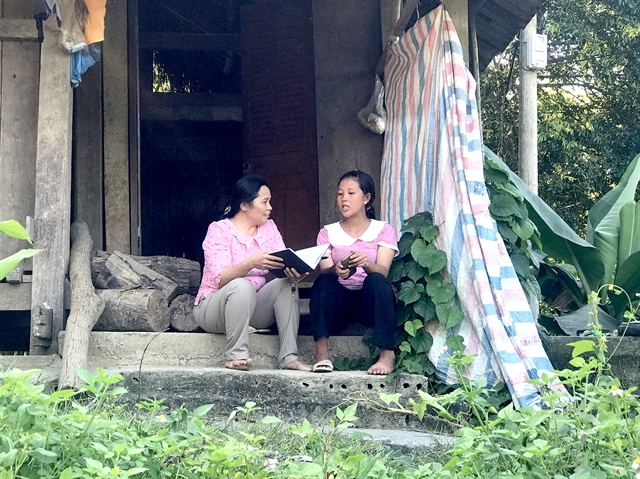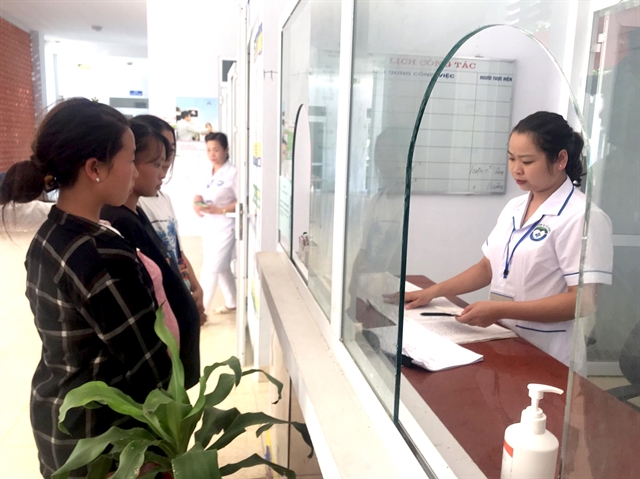 Society
Society

 |
| Hầu Thị Hoa (right) listens to a village-based midwife giving her guidance about taking care of baby. |
BẮC KẠN — Hầu Thị Hoa, 16, used to think that prenatal check-ups were unimportant and unnecessary.
Living in Khuổi Đẩy Village, Bình Trung Commune, Chợ Đồn District in Bắc Kạn Province, the Dao ethnic minority woman is in her ninth month of pregnancy.
Previously, her mother and other women in the neighbourhood did not have any prenatal check-ups during their pregnancy.
But now, with education and guidance from local medical workers, she appreciates that periodical examinations are critical to reducing the dangers to her and her child.
Hoa regularly goes to the Bình Trung Commune Medical Station for check-ups.
Ma Thị Huề, a village-based midwife, said that after training on basic midwifery education, 15 midwives are well-prepared to educate mothers’ on babies’ health in many villages in the commune.
They meet monthly to discuss problems and plan for the next month of pregnancy.
Hoa is just one of many pregnant women from 60 remote ethnic communes of the six most disadvantaged provinces of Bắc Kạn, Lai Châu, Sơn La, Đắk Nông, Kon Tum and Gia Lai. They are all now benefiting from innovative interventions to stop preventable maternal deaths.
This is the ultimate goal of the United Nations Population Fund (UNFPA) project “Leaving no one behind: innovative interventions to reduce maternal mortality in regions home to many ethnic groups in Việt Nam”, which started in September this year.
The project is an important initiative in reducing maternal mortality among ethnic minorities in the six provinces in Việt Nam, with total fund up to US$2.1 million from UNFPA and its partners.
UNFPA will deliver the project in collaboration with the Ministry of Health (MoH), provincial departments of health in the selected provinces, and local civil society organisations until September 30, 2024.
Việt Nam has made significant progress in improving sexual and reproductive health in the past 20 years and was one of the only six countries in the world which achieved, in 2015, the Millennium Development Goal - 5 (MDG5) on the reduction of maternal mortality.
 |
| Pregnant women register for prenatal check-ups at the Bình Trung Commune Medical Station in Chợ Đồn District, Bắc Kạn Province. — VNS Photos Thu Trang |
However, experts believe that disparities and inequalities remain in accessing and utilising sexual and reproductive health services among different ethnicities and regions.
Current evidence shows that while the maternal mortality ratio has declined to 46 maternal deaths per 100,000 live births at the national level, it remains as high as 100-150 per 100,000 live births in mountainous and ethnic regions, particularly in northern midlands, mountains, and Central Highlands.
Among all maternal death cases, maternal mortality is extremely high in some vulnerable ethnic groups. For instance, Mông 60 per cent and Thái 17 per cent.
It is estimated that the risk of Mông’s mothers dying from pregnancy or childbirth is four times higher than the Kinh- the majority group. Moreover, more than half of maternal deaths happen at district and provincial hospitals due to the limited capacities of healthcare facilities to manage maternal complications.
In addition, remote and hard-to-reach geographical locations, low socio-economic conditions, cultural barriers and a limited understanding of maternal complications are also contributing to high maternal mortality.
The project aims to increase access to integrated, quality and voluntary sexual and reproductive health services amongst ethnic groups, improve emergency obstetric care management capacity in mountainous localities and build a village-based birth attendant network in remote localities.
COVID-19 prevention and control will also be integrated into the existing sexual and reproductive health programme. In light of digital transformation, innovative interventions include online services such as smartphone apps to improve sexual and reproductive health services delivery among ethnic groups.
The project will also deliver innovative health and community education to ethnic communities to promote safe maternal deliveries.
Naomi Kitahara, UNFPA Representative in Việt Nam, stressed that it was another landmark step in UNFPA’s work to support women and girls, especially those in remote, ethnic communities.
“It is to ensure the provision of quality sexual and reproductive health services to prevent maternal deaths, thus contributing to Việt Nam’s efforts to achieve its SDGs by 2030,” she said.
Nguyễn Đức Vinh, former director of the Maternal and Child Health Department under the MoH, said at the project launch on September 21, 2021: “Improving the health status of people who are left behind, including ethnic minorities, is the centre of the Government’s development agenda. Lessons learned and best practices drawn from this initiative will help us effectively implement the national action plan on maternal, neonatal and child health for 2021-25 with a vision towards 2030 to achieve SDG targets on health care”.
Bjorn Anderssen, UNFPA Asia-Pacific Regional Director, said that over the past 28 years, Việt Nam had made considerable achievements in implementing the International Conference on Population and Development (ICPD)’s priority.
“UNFPA partners with the Vietnamese Government at both national and sub-national levels, UN agencies, social and civil society organisations, private sectors and development partners to contribute to the national efforts towards a more equitable and sustainable society,” he said. — VNS




